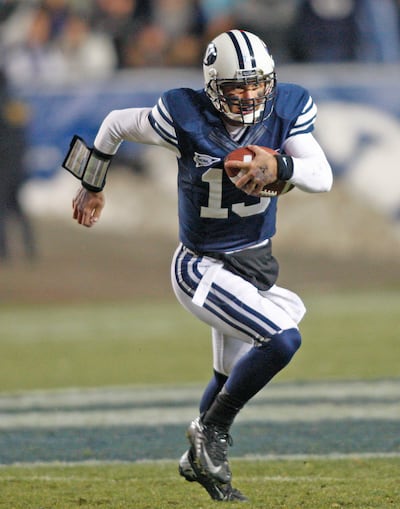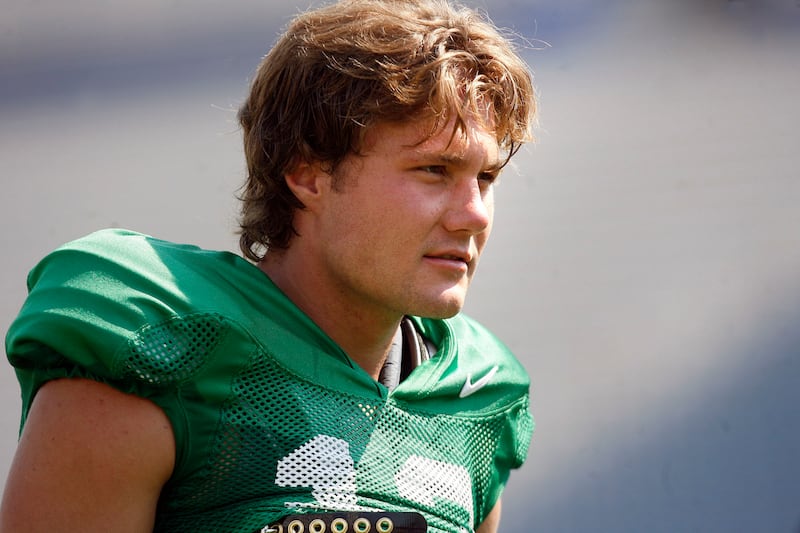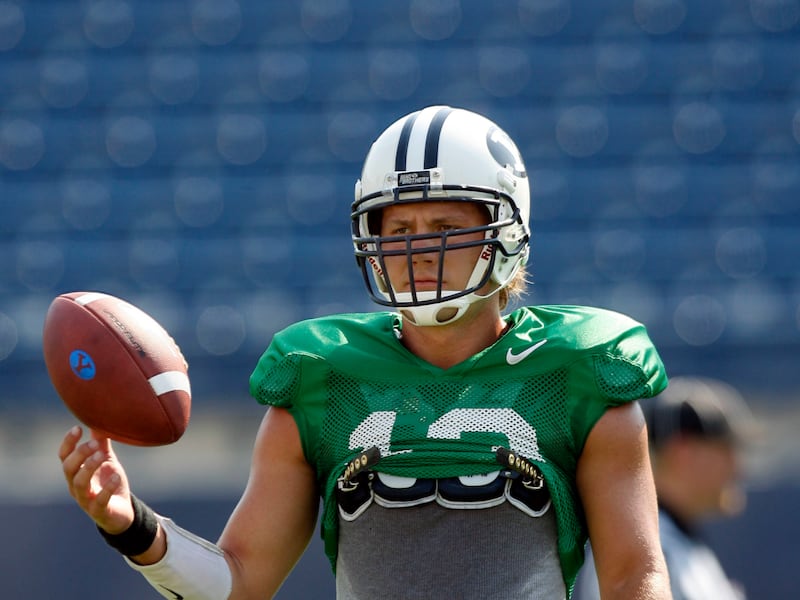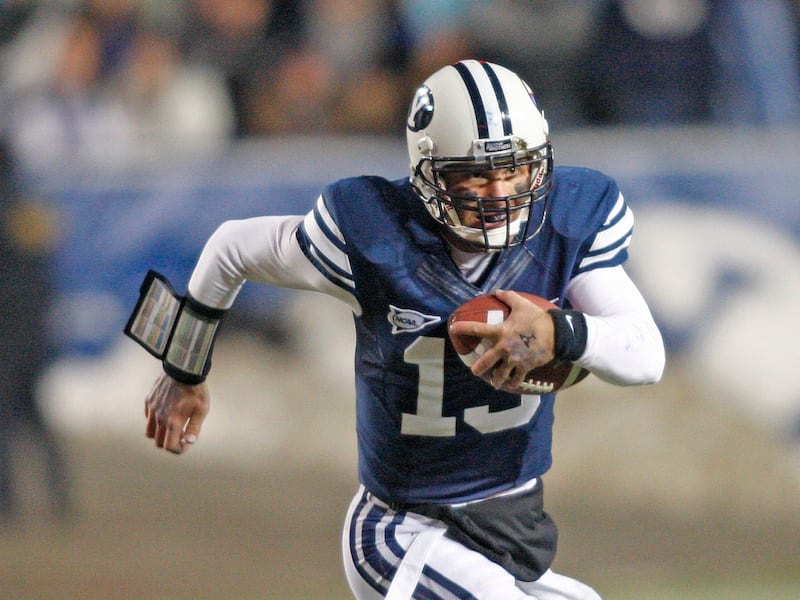SALT LAKE CITY — Riley Nelson played for two college teams, in two conferences, and later as an independent. He won, lost and won back his starting position several times. One year he platooned as a co-starter.
If not for road losses at Utah and Boise State, by a combined four points, he may have departed BYU a conquering hero. Instead, he was both cheered and vilified by fans of all three FBS programs in the state — including his own. On good days, he was a dual-threat wonder who could make plays when his protection had collapsed and his receivers had run out of space. The same year he lost to Utah and BSU, he beat Washington State and Georgia Tech.
On bad days, he was in enough pain to nearly pass out on the sideline.
Otherwise, nothing at all happened during his college football career.
“If circumstances can happen to a college football player, on the field, I’ve been there,” Nelson says.
It’s only fitting he would be the replacement for longtime BYU football radio analyst Marc Lyons when the season opens this fall. The Cougar lightning rod from 2009-12 is now calling the games from a different vantage. Nelson says his goal is “to be as objective as possible” and not be either too critical or too laudatory.
“That happens a lot, especially at BYU,” he says. “We exaggerate the good and also exaggerate the bad.”
My football experience in Utah was windy and rocky, but it has been overwhelmingly positive. I owe so much of who I am today to those experiences. – Riley Nelson
It would be hard to hyperbolize Nelson’s story.
Few eras at BYU have been more tumultuous than Nelson’s. When he arrived in 2009, following a year at Utah State and a mission for The Church of Jesus Christ of Latter-day Saints, Max Hall was embarrassing defenses as the Cougars' signal-caller. The next year marked the star-crossed arrival of Jake Heaps. Taysom Hill showed up for Nelson’s senior season.
Nelson was an undersized, big-hearted player who in his last year alone broke his back, tore rib cartilage and sustained a collapsed lung. In his career finale, the Poinsettia Bowl, he threw just two passes — one an interception — and rushed once. Replacement James Lark was so good late in the year that fans grumbled he should always have been the starter.
Never mind Nelson had enough injuries to earn a Purple Heart.
Even as an 18-year-old, playing as a freshman for Utah State, Nelson knew how to project confidence and competence. No BYU quarterback has been better at handling criticism. After one game, in which he didn’t play well, Nelson was being grilled by the media. He evenly replied that nobody was trying to make mistakes. It might be a great defensive play, missed block, poor read, blown catch or overthrown pass that caused the trouble, but no one purposely fails.
These things get overlooked in favor of end results.

Nelson spent most of his career in pain. In 2010 he had shoulder surgery and played in just three games. But it was the 2012 vertebrae injury that was the biggest pain in the, um, back. Coaches kept the injury’s seriousness quiet for a time, which didn’t help with the impatient fan base. Nelson told the coaches he always wanted to play unless he became a hindrance.
“Honestly,” he says, “I believe everyone was trying to do the right thing.”
Kind of like KSL Newsradio putting him out front once again.
He says in hindsight, if he were advising a son, he would tell him to get healthy before trying to slay dragons.
Nelson was never a rangy, rifle-armed quarterback. He was an undersized pit bull. It was his leadership and toughness that took him places. He once directed the second-team offense to a win over the starters in the spring game, after which teammates carried him off on their shoulders.
For a spring game.
They knew he was bringing his best, big games or small, with or without all his limbs.
Had the Cougars beaten Utah and BSU in 2012, they would have gone into their final regular-season game with just three losses — Notre Dame, Oregon State and San Jose State. A pair of missed field goals with no time on the clock against Utah, and a pick-six by a Boise State nose tackle were the difference.
BYU, which talked of winning national championships soon after going independent, finished the season 8-5.
Nelson calls the difference between fair and great seasons “a razor’s edge.”
There’s not a trace of bitterness in his voice. He says the decision to transfer from USU to BYU was “the best of my life, related to sports.”
He counts himself lucky to know some of the greatest quarterbacks to wear a BYU uniform.
“To be part of that brotherhood is something I never even imagined,” he says.
Nelson drew the ire of USU fans for transferring, Utah fans for merely being BYU’s quarterback and even some Cougar fans who felt Nelson didn’t live up to the legacy.
True to form, the guy who played spring games like they were Super Bowls remains upbeat.
“My football experience in Utah was windy and rocky, but it has been overwhelmingly positive,” he says. “I owe so much of who I am today to those experiences. More than the successes — yeah, there was talk, being vilified, smirking — but I’m grateful for it. Because when I stepped into the real world, all those experiences helped me. I got a crash course from ages 18 to 23, so when you step in the real world, you’re like, yeah, this is it. I’m extremely happy with my life.”




